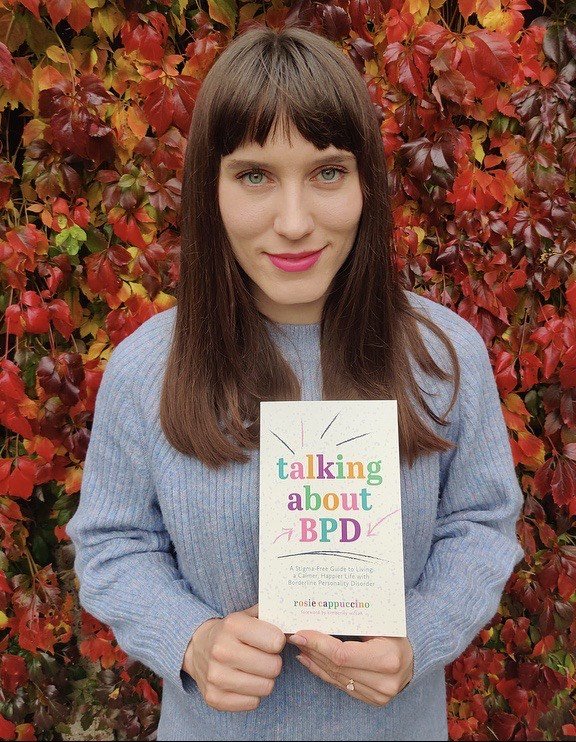I love hearing from new authors and I’m very excited about Talking About BPD: A Stigma-Free Guide to Living a Calmer, Happier Life with Borderline Personality Disorder (Jessica Kingsley Publishers, 2021) by Rosie Cappuccino.
I hope that you enjoy this interview with Rosie. —Amanda
Tell us about your background. Why write Talking About BPD?
I’ve been blogging about borderline personality disorder (BPD) since the beginning of 2014. I started blogging because I needed an outlet to express the fear, confusion and loneliness I felt regarding my new diagnosis. I didn’t neither knew anyone with BPD nor understood how to manage it, so I was looking to connect with others who could help me learn more about myself. I also recognised immediately the horrendous levels of stigma associated with BPD and I wanted to share my experience of this condition—an experience that bore very little resemblance to depictions I saw online and read about in books.
After a few years, my blog started to grow and I started doing more podcasts and writing. In 2019, I won a Mind Media Award for my work towards increasing understanding towards people with BPD and it was around that time that my book started to take shape. I wanted to produce a book that could bring comfort and validation to people with, or who related to, a diagnosis of BPD. I know how isolating and agonising life with such a stigmatised condition can be and I wanted to do something that might alleviate the pain somewhat.
What is the most important message in your book for individuals who have just been diagnosed?
There are a handful of key ‘takeaways’ I think- and people who have contacted me since the book’s release have affirmed these. Firstly, that people with BPD are not what the stereotypes present them as; they are not manipulative, attention-seeking or dramatic.
People with BPD commonly experience intense distress and it’s only natural that a person’s behaviour will reflect how distressed they feel inside. Secondly, the book offers a message of hope that things can feel better over time; its readers are lovable, valuable, worthy of respect and deserving of care, even when they may have been told (directly or indirectly) that they are not.
What do you wish more mental health professionals knew about BPD?
I wish that all mental health professionals tried to imagine themselves into the shoes of a person in such intense distress. When a professional uses their imagination (or perhaps even lived experience) to empathise to the deepest possible level, then I believe they are less quick to judge emotional distress and the person in front of them. In my opinion, the most effective mental health professionals are those who show unfailing respect for an individual, even when that person is living, thinking, feeling, communicating and behaving differently to them.
I want high-quality, stigma-free training on borderline personality disorder to be widely available to all mental health professionals so that they are fully-equipped to understand and skillfully support people with this condition who come into their settings. I also want professionals to think critically when they encounter myths and stereotypes, rather than blindly accepting them and then have the courage to stand up and challenge them, even when that involves questioning what a colleague or a manager is saying.
How do you think family members and friends can help someone who has just been diagnosed with BPD?
First of all, loved ones of people with BPD need to learn about the condition from reputable and non-stigmatising sources. They need to be careful not to absorb stigma and then pass on its damaging effects. Secondly, I would recommend ongoing dialogue with the person affected by asking open questions like ‘what would help you?’, ‘how can I communicate most helpfully with you?’, ‘what makes you feel comfortable?’. Also people with BPD often experience boundaries as cold and rejecting.
I would also advise family and friends to assert boundaries with as much gentleness as possible. It can be really helpful to show care and consistency, even with little things like texts to say hello.
What has helped you the most in your recovery journey?
Without a doubt, the most helpful thing for me has been dialectical behaviour therapy (DBT). Almost immediately after starting DBT, there was an improvement in my emotional regulation, as well as my ability to cope with suicidal thoughts and urges to self-harm. After years of not knowing how to manage intense emotions and overwhelming urges, I finally learnt the skills to respond effectively to my emotional dysregulation. In the context of DBT, I finally felt seen and understood, rather than judged. My everyday terror was acknowledged and, after a decade of fear, I began to feel safe in my own mind and body. The relief was like stepping out of a blizzard into a warm home.
What are you currently reading or listening to?
I’ve just finished reading The Miniaturist by Jessie Burton, a novel set in Amsterdam in the 1600s. The level of detail was gorgeous, the writing was so rich that all my senses were activated whilst reading it. I love to read which is probably why I studied English Literature at university.
What's next for you?
I’m resting at the moment. Honestly, writing a book is full on and it takes a lot of emotional and cognitive energy. There is so much work that goes into the book other than all the writing and editing, such as sorting out the contract, corresponding with the publisher and the launch. I will be continuing with my blog and social media as I continue to derive so much satisfaction from expressing myself and interacting with individuals there. I would like to do more podcasts, radio or maybe even something for TV if an opportunity ever comes my way.
Congratulations, Rosie! You can purchase Rosie’s book here on Amazon.com and here on Amazon.ca.
You can follow Rosie’s Instagram account here.

